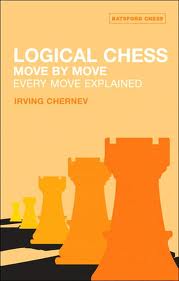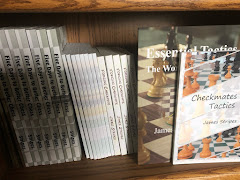On 1 January 2012, I expressed my objective of raising my USCF rating over 1900. I was rated 1879 at the time. In 2012, I played in three standard rated events. The first lifted me to 1933 and I took second place in Spokane's premier event. My second event of the year had not been on my calendar. The Spokane Contenders Tournament is by invitation only, and the slots are determined by Grand Prix points. Due to my relatively inactive playing schedule, I did not expect to play this year. Nonetheless, I made it in by a fraction of a point, and then I won the event! My final game in the event, a draw against Michael Cambareri, ended my streak of eleven consecutive wins. It also pushed my rating to 1982.
My third and final standard rated USCF event (I played in two quick rated events later in the year) was the Spokane City Championship, which I lost 2 1/2 - 1/2. It dropped my rating to 1970--still 91 Elo higher than a year ago. I blogged the first round draw, and my second round loss, with an unfulfilled promise to annotate the third game. My first goal for 2013 is to complete those annotations.
Although I met my rating goal, I failed to make a consistent effort in training through the whole year. In my New Year's Resolutions for 2012, I set out three goals. I did well on the first of these through eight months (see "Training Log: Travel"). The second never became habitual, and the third brought forth occasional feeble effort.
I would like to set a goal of making Expert in 2013. That goal cannot be met without consistent training. Developing realistic plans, rather than expressing hubris is the order of the day. My plans to make Expert follow from improvements in training. A resolution requires measurable behaviors. I met my rating goal in 2012, but fell short in efforts to improve my training regimen.
Tactics training became frustrating this fall. When I did not train several times per week, nor even every week, my abilities quickly atrophied. It hurts to get problems wrong. My training was vigorous enough into the middle of August that my average for the year probably exceeded fifty problems per week. As a consequence of less training in the fall, my play in two quick rated events in November dropped my quick rating as much as my standard had risen earlier in the year (see "'Tis but a flesh wound").
Resolutions for 2013
In 2012, my first resolution was fifty tactics problems per week. This goal requires modification for 2013. I must train every single month of the year. Some weeks, work and other distractions might interfere with completion of chess problems, but most weeks I can and should do more than fifty.
1) In 2013, I will solve correctly 300 tactics problems each month.
Major sources for problems include Chess Tempo, Chess.com's Tactics Trainer, Shredder iPad app, Chess-wise iPad app, Tactic Trainer for the iPad, Chess Informant Anthology of Chess Combinations, and perhaps two dozen books.
I will aim to keep some of the books, such as Lev Alburt's Chess Training Pocket Book, an integral part of the training. With consistent effort, perhaps the 2012 goal of making Imagination in Chess a habitual training resource will become reality in 2013.
I will track my progress through the Anthology of Chess Combinations. It is not unreasonable to expect to solve just over 2700 well-selected chess problems over the course of a year or two. Comprehension, rather than quantity is the objective with this resource.
At the time of this writing, I have solved 1917 problems on the Shredder iPad app. When I get to 2000, I will have been through the entire set twice. At that time, planned for the first week of the new year, I will reset the app. In 2013, I will go through these 1000 problems a third time.
2) In 2013, I will study whole games and whole books.
While I was progressing exceptionally well in the first of my 2012 resolutions, and not wholly neglecting the other two, I added a fourth: memorizing chess games. At one point in early summer, I was capable of playing through ten games. Some of these need review because I know pieces, but not the whole. Meanwhile, my list has grown.
Memorizing chess games is not an end itself, and only partly a means to an end. Rather, memorization is a normal consequence of thorough understanding of a game. I noted in "Soviet Chess Politics" that I was able to play through from memory Anatoly Karpov's slaying of Victor Korchnoi's Dragon after fifteen minutes of study. Another game worked its way into my memory through a similar process in mid-December. I started reading Irving Chernev, Logical Chess: Move by Move (1957). After playing through the first game three or four times, I showed it to some young players in an after school chess club without reference to book or database.
Unlike previous readings of this book, dating back to the 1970s, this time I go through each game several times before reading Chernev's comments. I have a database that contains the 33 games from this book. I stripped out all annotations from the database and then saved the clean copy on my iPad and in ChessBase 11 on my laptop. Studying each game, I note the turning points, the key strategic ideas, the tactics found, and the tactics missed. Then, when I am satisfied that I understand the game, I read through Chernev's comments. In two weeks I have gone through one-third of the book.
I will finish Chernev's classic text in January, then move on to a more advanced similar book: Neil McDonald, Chess: The Art of Logical Thinking (2004). Perhaps I will tackle John Nunn, Understanding Chess Move by Move (2001) after McDonald. McDonald and Nunn pattern their books after Chernev's, but the games are more recent, and the analysis more sophisticated (as well as having benefited from checking by computer). These two books each contain thirty games.
My focus is not necessarily on this specific type of book, but upon the discipline to read through a book in a particular way, and to finish the book. I have more than two hundred chess books, but cannot point to a single instructive book and say, yes, I have read that book clear through. I've read the words of many chess books, but read the instructive portions selectively. In 2013, I will begin to be able to say, yes, I have read that chess book cover to cover!
3) In 2013, I will finish my Pawn Endgame Flash Card project
My third resolution for 2013 is the same as my third resolution for 2012. While reading books that annotate whole games calls for the method outlined above, endgame textbooks call for a different methodology. Thorough understanding of the first chapter in Mark Dvoretsky, Dvoretsky's Endgame Manual is all that I ask of myself in this resolution.
4) In 2013, I will lose fifteen pounds
Physical training is essential to chess performance. I am obese. Although I lost 35 pounds in 2010, I began 2012 at the same weight as I began 2011, ten pounds above my summertime low in 2010. In summer 2011, I reached the same low as in 2010, but I failed to get there in 2012. I let rainy weather deter me from my customary walks. Even though walks of five to eight miles became more common in 2012, there were more days with minimal exercise than the year before. There were two bright spots in 2012, however. My wife and I added a Nordic Track Recumbent Bike to our home for foul weather exercise. We also adopted two new family members who will demand frequent long walks.
If I lose fifteen pounds, I will be at a weight that I passed on the way up in the early 1990s. Back then, I worked construction in the summers, which helped maintain some fitness through the endless reading and writing of graduate school.
| Chess player in training |














I succeeded in losing three stones. More importantly, I have kept it off for over a decade. I believe that the critical success factor is to make absolutely sure that no unwanted pound lost is ever regained. Fight over the first pound not the last one! Never take your eye off the ball! I weigh myself every day, work out weekly averages, and compare them with the averages for previous weeks. If my weight is going up, I eat about 100 calories per day less. If it falling, I eat about 100 calories per day more.
ReplyDeleteAfter a high blood pressure diagnosis, I dropped 35 lbs in five months. 25 labs have remained gone. The ten that come and go are a direct consequence of gluttony and laziness. Also, when I fail to plan meals and work gets busy, it is too easy to pop four blocks over to Carl's for a six-dollar burger and fries.
Delete